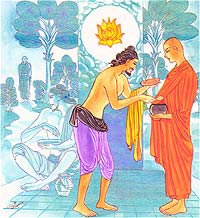Posted by: site admin @ 9:19 pm
𝓛𝓔𝓢𝓢𝓞𝓝 4168 Wed 1 Dec 2021
Six rewards that should act as a motivation for establishing the perception of anicca.
Pāḷi |
English |
|
|
|
a monk goes to meditate alone and finds his mind overwhelmed with
harmful, unwholesome conditions. He asks the Buddha for advice, and the
Buddha tells him nine things he can do to improve his meditation – with a
particular emphasis on the importance of having good spiritual friends
(kalyāṇa-mittā).
bhikkhave, ānisaṃse sampassamānena alameva bhikkhunā sabbasaṅkhāresu
anodhiṃ karitvā aniccasaññaṃ upaṭṭhāpetuṃ. katame cha? ‘sabbasaṅkhārā ca
me anavatthitā khāyissanti, sabbaloke ca me mano nābhiramissati,
sabbalokā ca me mano vuṭṭhahissati, nibbānapoṇañca me mānasaṃ
bhavissati, saṃyojanā ca me pahānaṃ gacchissanti, paramena ca sāmaññena
samannāgato bhavissāmī’ti. ime kho, bhikkhave, cha ānisaṃse
sampassamānena alameva bhikkhunā sabbasaṅkhāresu anodhiṃ karitvā
aniccasaññaṃ upaṭṭhāpetun”ti.
seeing six rewards, it’s enough motivation for a monk to establish the
perception of inconstancy with regard to all fabrications without
exception. Which six? ‘All fabrications will appear as unstable. My mind
will not delight in any world. My mind will rise above every world. My
heart will be inclined to Unbinding. My fetters will go to their
abandoning. I’ll be endowed with the foremost qualities of the
contemplative life.’ In seeing these six rewards, it’s enough for a monk
to establish the perception of inconstancy with regard to all
fabrications without exception.”
By giving up a modicum of pleasure, which the worldly pursuits bring,
if one can be assured of tremendous pleasure - which is Nibbana - the
wise person should give up the little pleasure.

The individual who achieves happiness by inflicting pain on others is
not freed from anger because he is entangled in the web of anger due to
the contact of the anger of other people.

If people do what should not be done, and neglect what should be done,
the blemishes of those proud, slothful ones begin to increase.
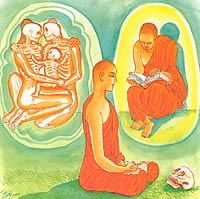
If one were to practice constantly on the mindfulness of physical
reality, maintaining steady attention on what has to be done, they will
shun what should not be done. The blemishes of those mindful, alert will
get eroded.

The brahmin kills the mother - craving, kills the father - egotism,
self-cherishing: They represent the two views, Eternalism and Nihilism,
opposed to Buddhist thought. The subordinates are clinging to life. And
he destroys the defilements which cling to life. Having destroyed all
these, the brahmin (arahat) goes without punishment.

The brahmin (arahat) kills the mother - craving; kills the father -
egotism; kills the two learned kings. They represent the two false views
eternalism and nihilism. He kills the five tigers (sensuality, hate,
mental inertia, worry and skeptical doubt) that obstruct the path. And,
having done all these killings, the arahat goes about unaffected.
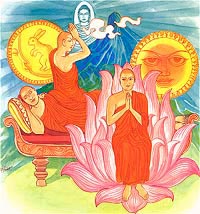
Those disciples of the Buddha who are mindful of the virtues of their
Teacher day and night, arise wide awake and in full control of their
faculties.

Those disciples of the Buddha who are mindful of the virtues of the
Dhamma day and night, arise wide awake and in full control of their
faculties.
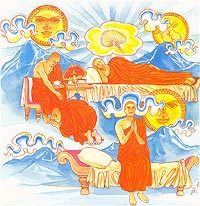
Those disciples of the Buddha who are mindful of the virtues of the
Sangha day and night, arise wide awake and in full control of their
faculties.
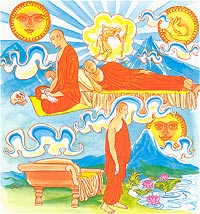
Those disciples of the Buddha who are mindful of the real nature of the
body day and night, arise wide awake and in full control of their
faculties.
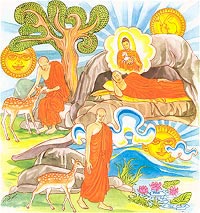
Those disciples of the Buddha who take delight in harmlessness day and
night, arise wide awake and in full control of their faculties.

Those disciples of the Buddha who take delight in meditation day and
night, arise wide awake and in full control of their faculties.

It is hard to become a monk; it is hard to be happy in the practice of a
monk. To live with those of a different temperament is painful. A
traveller in samsara is continually subject to dukkha; therefore, do not
be a traveller in samsara; do not be the one to be repeatedly subject
to dukkha.

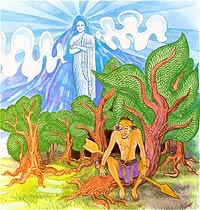
Like the Himalayas, the good are visible even from afar; like arrows
shot in the night, the wicked are not seen even though they may be near.
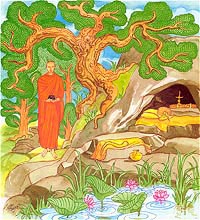
He who sits alone, lies down alone, walks alone, in diligent practice,
and alone tames himself, should find delight in living in the forest.

